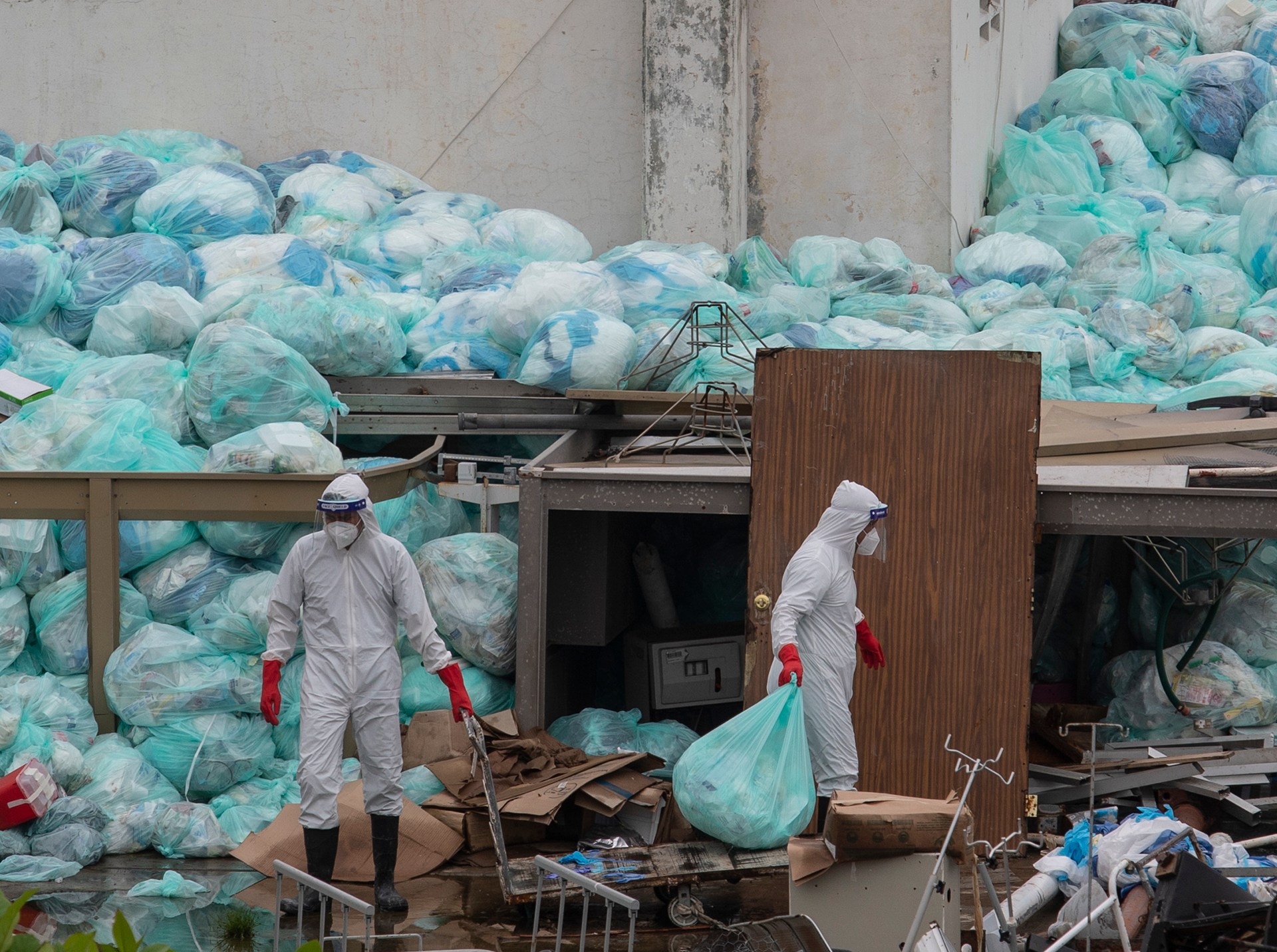Environmental Obligation: The Eco-Friendly Strategy to Medical Waste Disposal
Environmental Obligation: The Eco-Friendly Strategy to Medical Waste Disposal
Blog Article
The Value of Proper Garbage Disposal Practices
From the effects of incorrect waste disposal on our setting to the long-term implications for future generations, the relevance of taking on sustainable waste management practices can not be overemphasized. By discovering the environmental impact of reckless waste disposal, the advantages of recycling campaigns, and the importance of neighborhood interaction in waste decrease initiatives, a deeper understanding of why appropriate waste disposal techniques are crucial emerges.
Ecological Effect of Improper Disposal
Inappropriate disposal of waste poses a considerable threat to the environment because of its damaging effects on environments and human wellness. When waste is not effectively managed, it can cause contamination of the dirt, water, and air, causing harm to different plant and animal types. click here. Chemicals and toxic substances from poorly disposed waste can seep into the ground, contaminating groundwater sources and affecting the health of both wildlife and people
Moreover, the build-up of waste in land fills generates greenhouse gases like methane, adding to environment adjustment and international warming. Inappropriate disposal practices also result in littering, which not just degrades the aesthetic value of the environment but can likewise hurt wildlife through ingestion or entanglement.
To mitigate these environmental impacts, it is essential for communities and people to adopt correct waste disposal practices such as reusing, composting, and liable dangerous waste disposal. By taking these steps, we can help shield ecosystems, maintain natural deposits, and protect human health for future and existing generations.
Advantages of Recycling Programs
Consistently taking part in recycling programs supplies many advantages for both the environment and culture in its entirety. Among the crucial benefits of recycling is the preservation of all-natural resources. By recycling products such as paper, plastic, metal, and glass, less basic materials require to be removed from the planet, resulting in reduced logging, mining, and drilling tasks. This preservation of sources not only aids in preserving ecological balance but likewise adds to sustainable growth.
Additionally, reusing plays an important duty in reducing energy intake and greenhouse gas emissions. The manufacturing of products from recycled products generally needs much less power compared to producing from virgin sources - medical waste disposal. Therefore, the carbon impact linked with the production procedure is considerably reduced, assisting in the battle versus climate modification
Furthermore, recycling programs produce task possibilities in the reusing industry, promoting economic growth and social welfare. By encouraging the recycling and reuse of products, these programs sustain a circular economy that decreases waste generation and makes the most of source performance, inevitably bring about a cleaner, greener future for generations to come.
Contaminated Materials Monitoring Standards
Applying reliable contaminated materials management guidelines is essential for reducing environmental and health and wellness dangers related to the incorrect disposal of harmful materials - click here. Appropriate handling, therapy, and disposal of unsafe waste are important to protect against contamination of soil, water sources, and air
One secret standard appertains labeling of unsafe waste containers to ensure risk-free handling and transport. In addition, facilities have to abide by stringent storage requirements to avoid leaks, spills, or accidents that can jeopardize human wellness and the setting. Routine training programs for employees on dangerous waste management techniques are additionally essential to make sure conformity with policies and promote a society of security.
Additionally, contaminated materials should be set apart based on its properties to stop chemical responses that could lead to unsafe circumstances. Implementing a thorough waste monitoring system can help check the activity of harmful materials from generation to disposal, ensuring openness and liability. By complying with these guidelines faithfully, markets and businesses can add to a much safer and cleaner environment for future and existing generations.
Community Participation in Waste Reduction
To properly attend to the environmental and wellness threats related to contaminated materials management, involving the neighborhood in waste decrease campaigns is paramount. Area involvement plays a vital function in promoting sustainable waste management techniques and promoting a society of ecological responsibility. By informing citizens regarding appropriate waste segregation, reusing, and composting techniques, communities can significantly reduce the quantity of waste sent to garbage dumps, thereby decreasing environmental contamination and saving natural deposits.
Area participation in waste decrease programs also assists in raising understanding concerning the value of waste reduction and encourages people to adopt environmentally friendly behaviors in their lives - medical waste removal service. Collaborative initiatives between neighborhood authorities, waste administration firms, and neighborhood members can lead to the implementation of reliable waste reduction approaches tailored to the details requirements of each community or town
In addition, community interaction promotes a feeling of possession and liability amongst homeowners, empowering them to take proactive steps in the direction of reducing waste generation and promoting a cleaner, healthier setting for current and future generations. By working together towards common waste decrease objectives, areas can make a significant effect on reducing the unfavorable results of improper garbage disposal practices.

Future of Sustainable Waste Practices
The advancement of lasting waste techniques is vital for advancing ecological stewardship and resource conservation in the coming years. As the global populace continues to expand, so does the amount of waste produced (medical waste removal). Standard waste disposal techniques, such as landfilling and incineration, are no longer lasting in the lengthy term because of their significant ecological impacts. Moving on, the future of lasting waste practices hinges on welcoming a circular economy method, where sources are reused, reused, or repurposed to reduce waste generation.
Technological innovations play a crucial role fit the future of lasting waste techniques. Advanced waste sorting and recycling innovations can assist boost the effectiveness of waste management procedures, enabling the healing of valuable resources from waste streams. Furthermore, the adoption of biodegradable products and composting approaches can aid lower the amount of organic waste winding up in garbage dumps, thus reducing greenhouse gas discharges.
Furthermore, advertising consumer understanding and education and learning on appropriate waste website link partition and disposal practices is necessary for driving behavior modification towards sustainability. By promoting a society of waste decrease, reuse, and recycling, neighborhoods can jointly add to a cleaner and healthier environment for future generations.

Verdict
To conclude, proper garbage disposal methods are important for reducing ecological impact and promoting sustainability. By executing recycling programs, taking care of contaminated materials appropriately, and motivating neighborhood participation in waste reduction initiatives, we can function towards a cleaner and much healthier environment. It is very important for businesses, federal governments, and people to prioritize sustainable waste techniques for the future health of our earth.

From the repercussions of improper waste disposal on our atmosphere to the long-term ramifications for future generations, the value of adopting lasting waste management methods can not be overstated. By discovering the environmental impact of irresponsible waste disposal, the benefits of reusing campaigns, and the relevance of area engagement in waste decrease efforts, a deeper understanding of why appropriate waste disposal techniques are critical arises.
By informing homeowners about proper waste segregation, recycling, and composting methods, communities can dramatically lower the amount of waste sent out to garbage dumps, thus lessening environmental contamination and conserving all-natural sources. (click here)
Moving forward, the future of lasting waste methods exists in embracing a round economy strategy, where sources are reused, recycled, or repurposed to lessen waste generation.
Advanced waste sorting and recycling innovations can assist improve the efficiency of waste monitoring procedures, permitting for the recuperation of useful resources from waste streams.
Report this page